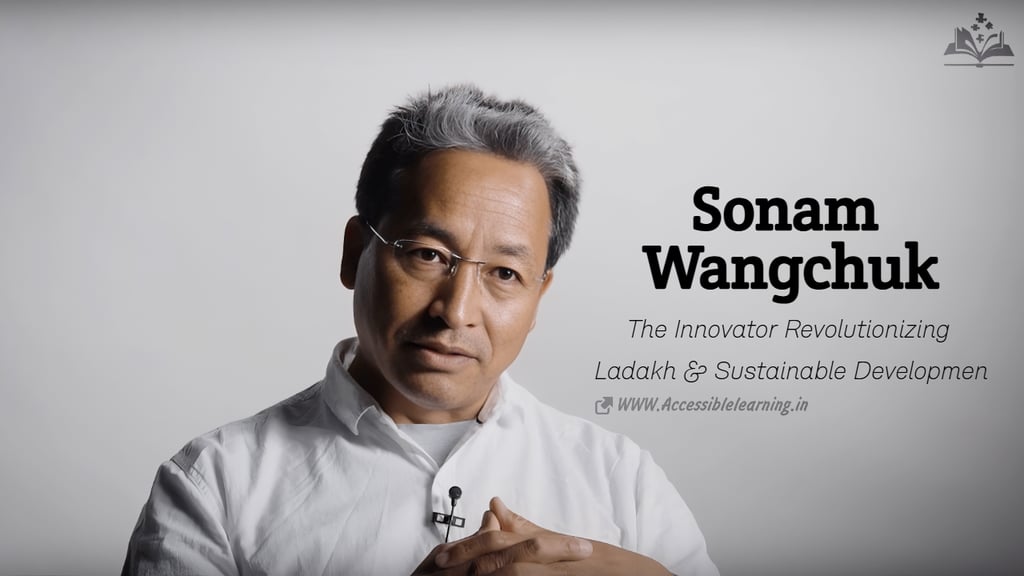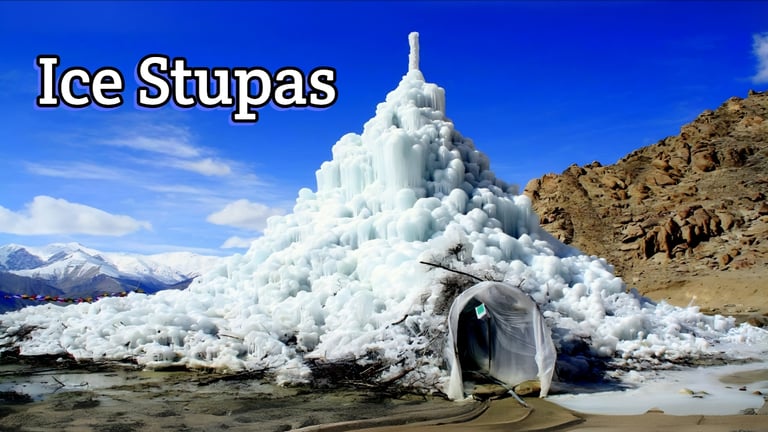
Sonam Wangchuk’s Ice Stupas & SECMOL: A Blueprint for a Sustainable Future
Sonam Wangchuk, the visionary engineer, innovator, and climate activist from Ladakh, is revolutionizing education, water conservation, and sustainable development. Discover his inspiring journey, Ice Stupas, SECMOL, and activism for climate and Ladakh's autonomy."
BIOGRAPHYGREAT SCIENTISTMODERN INDIAEDUCATION/KNOWLEDGE
Kim Shin
2/8/20254 min read


Sonam Wangchuk is a renowned Indian engineer, innovator, education reformist, and climate activist, known for his revolutionary contributions to sustainable development, alternative education, and environmental conservation. His Ice Stupas, SECMOL (Students’ Educational and Cultural Movement of Ladakh), and advocacy for Ladakh’s autonomy have positioned him as a global changemaker.
From transforming Ladakh’s failing education system to pioneering water conservation methods and advocating for climate policies, Wangchuk’s work has a profound impact. His practical, science-backed solutions have inspired people worldwide, proving that grassroots innovation can tackle some of the world's biggest problems.
Early Life and Education
Humble Beginnings in Ladakh
Born on 1st September 1966 in Uleytokpo, Ladakh, Sonam Wangchuk grew up in a region with harsh winters, water scarcity, and limited educational resources. His father, Sonam Wangyal, was a political leader, but Wangchuk’s education was unconventional from the start.
He faced early difficulties in school as his teachers taught in Urdu, while he was fluent in Ladakhi and Hindi. Misunderstood as a weak student, he quickly realized the flaws in India's education system, which later fueled his passion for reforming learning methods.
Overcoming Family Opposition to Pursue Engineering
Wangchuk always had a passion for engineering and problem-solving, but his father wanted him to become a civil servant. With little support, he left Ladakh at 17 years old and moved to Srinagar to pursue his dreams independently.
In 1987, he earned a degree in Mechanical Engineering from the National Institute of Technology (NIT), Srinagar. To support himself, he tutored students privately, showcasing his entrepreneurial spirit and deep commitment to education.
SECMOL: Revolutionizing Education in Ladakh
The Educational Crisis in Ladakh
In the 1980s, Ladakh’s education system was in crisis—a shocking 95% of students failed their 10th-grade state board exams. The curriculum was designed for plains regions of India, making it irrelevant to Ladakh’s climate, culture, and needs.
Establishing SECMOL (1988)
To address this, Wangchuk founded SECMOL (Students' Educational and Cultural Movement of Ladakh) in 1988, an initiative to make education practical, relevant, and empowering.
Key Features of SECMOL:
Hands-on, Practical Learning: Focuses on solar technology, farming, and entrepreneurship.
Culturally Relevant Curriculum: Integrates local knowledge, environmental science, and sustainability.
Sustainable, Solar-Powered Campus: The SECMOL campus runs entirely on renewable energy and is built using earth-friendly materials.
Empowering Women: SECMOL encourages Ladakhi girls to take leadership roles, promoting gender equality.
SECMOL transformed education in Ladakh, helping students achieve a 75%+ pass rate, while also serving as a global model for alternative learning.


The Ice Stupa: A Revolutionary Water Conservation Solution
Ladakh’s Water Crisis
Ladakh’s farmers depend on glacial meltwater for irrigation, but due to climate change, glaciers are melting unpredictably, causing severe water shortages in summer.
How the Ice Stupa Works
To solve this, Wangchuk developed the Ice Stupa, a man-made glacier that stores water in winter and melts in summer, providing a steady water supply.
The process:
Water is piped down from streams and released in freezing temperatures.
It forms ice towers shaped like stupas (Buddhist shrines), reducing melting speed.
These ice structures release water gradually in spring, when farmers need it most.
Global Impact of Ice Stupas
The Ice Stupa model is now being tested in the Alps, Nepal, and the Andes to fight water shortages.
Wangchuk won the Rolex Award for Enterprise (2016) for this invention.
It demonstrates how local knowledge and engineering can combat climate change globally.
Advocacy for Climate Change and Ladakh’s Autonomy
Protecting the Himalayas from Environmental Damage
Sonam Wangchuk has been a strong advocate for protecting Ladakh’s fragile ecosystem. He highlights how:
Unchecked tourism, infrastructure projects, and climate change threaten Ladakh’s glaciers.
Melting glaciers could severely impact millions in India and South Asia.
Sustainable policies and local governance are necessary for Ladakh’s survival.
Demand for Ladakh’s Autonomy
Since 2019, Wangchuk has been fighting for Ladakh to receive special constitutional protection under the Sixth Schedule, ensuring local environmental and cultural preservation.
In 2023, he staged a hunger strike in sub-zero temperatures to demand policy changes.
He argues that big corporations and mining projects could permanently damage Ladakh’s unique ecosystem.
His activism has led to national debates on sustainable development in Himalayan regions.
Other Innovations & Future Vision
Himalayan Institute of Alternatives, Ladakh (HIAL)
In 2017, Wangchuk founded HIAL, a university focused on:
Sustainable architecture & green energy solutions
Practical education for mountain communities
Preserving Ladakh’s traditional knowledge
Solar-Heated Shelters
Wangchuk developed solar-heated mud houses, which stay warm without electricity, reducing dependence on fossil fuels.
Eco-Tourism & Sustainable Farming
He promotes responsible tourism and organic farming, reducing Ladakh’s carbon footprint.
Bollywood Connection: The 3 Idiots Inspiration
Sonam Wangchuk’s real-life work inspired Aamir Khan’s character, “Phunsukh Wangdu,” in the 2009 film 3 Idiots. The film captured elements of his education reforms, engineering brilliance, and problem-solving approach.
However, Wangchuk clarifies that his real work is much deeper than what was shown in the movie, as it focuses on systemic change rather than individual brilliance.


Awards and Global Recognition
🏆 Ramon Magsaysay Award (2018) – Asia’s Nobel Prize
🏆 Rolex Award for Enterprise (2016) – For Ice Stupas
🏆 Global Teacher Prize Nominee (2021) – For education reform
🏆 Earth Prize (2023) – For environmental advocacy
His work has inspired thousands of young engineers, policymakers, and environmentalists worldwide.
Sonam Wangchuk is not just an engineer or educator—he is a visionary leader fighting for a better future. His contributions to education, climate action, and sustainable development offer hope and solutions in a rapidly changing world.
At a time when the world desperately needs sustainable innovations, Wangchuk’s practical, science-driven solutions prove that one person’s vision can create global impact.
What We Can Learn from Sonam Wangchuk
✅ Education must be practical and culturally relevant
✅ Technology should work with nature, not against it
✅ Local solutions can solve global challenges
✅ Sustainability must be at the heart of development
His journey shows that real change begins with innovation, courage, and a deep commitment to the planet and people. 🌍🔥
Subscribe to our newsletter
All © Copyright reserved by Accessible-Learning
| Terms & Conditions
Knowledge is power. Learn with Us. 📚


